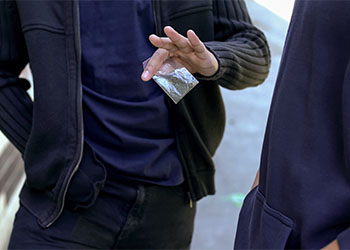Possession of Marijuana With the Intent to Sell
April 16, 2024
 The recreational use of marijuana is still illegal in the state of Florida. Because of this, when someone is charged with possession of marijuana with intent to sell, the consequences can be serious. If you're facing charges, it's essential you understand your rights.
The recreational use of marijuana is still illegal in the state of Florida. Because of this, when someone is charged with possession of marijuana with intent to sell, the consequences can be serious. If you're facing charges, it's essential you understand your rights.
At Defend Ocala, we’re here to dissect Florida's laws on marijuana possession with intent to sell, analyzing key provisions, potential defenses, and implications for those entangled in such legal matters.
Understanding the Offense in Florida
Possession with intent to sell is a serious charge under Florida law, carrying significant legal implications. This charge suggests that an individual not only had marijuana in their possession but also intended to distribute it. Intent to sell may be inferred from various circumstances, such as the presence of scales or packaging materials, large quantities of marijuana, or significant amounts of cash at the time of the arrest.
In Florida, the charge for this offense is based on the amount of marijuana you possess. Possession of 20 grams or less is typically classified as a first-degree misdemeanor, with penalties that may include one year in jail or 12 months of probation, and a $1,000 fine. Possession of more than 20 grams is a third-degree felony, punishable by up to five years in prison or 5 years of probation, and a $5,000 fine.
It's important to note that these are just the standard penalties. There are a multitude of factors that can lead to more severe consequences, and understanding these is crucial should you be facing such charges.
Penalties for Possession With Intent to Sell
When facing charges, it's important to understand the penalties associated with the charge of possession with intent to sell. Here, we’ll provide a concise overview of what you might face if found in violation of these regulations.
Understanding Florida's Drug Reform Act
Florida's Drug Reform Act governs the penalties for selling controlled substances, including marijuana. For instance, the Act uses the number of marijuana plants as one of the measures to assess the charge's severity. On its face, the possession of 25 or fewer plants incurs a mandatory minimum three-year prison sentence and a maximum of $25,000 in fines. These harsh penalties underscore the need to take possession with intent to sell charges exceptionally seriously.
Factors That Influence Penalties
Factors that heavily sway the severity of penalties include:
Quantity of Marijuana: The more significant the quantity, the harsher the penalty. Large amounts are frequently associated with more significant drug trafficking operations.
Criminal History: Repeat offenders often face more severe penalties due to the nature of the crime.
Presence of Minors: Selling drugs in the presence of minors can dramatically heighten penalties.
Proximity to Certain Locations: Being caught selling marijuana near a school or a place of worship can lead to the enhancement of penalties, as these are considered 'drug-free zones'.
Hence, understanding and respecting the intricacies of Florida’s marijuana laws is essential for staying within the bounds of legality.
Defenses Against Charges of Possession with Intent to Sell
Dealing with these charges can be difficult, but not impossible. If you're facing possession with intent to sell charges, several defenses might be available to you:
Lack of Intent: If there's insufficient evidence to prove you intended to sell the marijuana, this could be a defense.
Unlawful Search and Seizure: If your Fourth Amendment rights were violated, the evidence may be inadmissible, providing a potential defense.
Criminal Procedure Violations: Any police error regarding your rights or the proper procedures for your arrest can lead to a dismissal of charges.
Ultimately, leveraging these defenses effectively requires a legal strategy tailored to the specifics of your case.
What to Do If You've Been Charged
If you find yourself charged with possession of marijuana with intent to sell, act quickly and decisively. Here's a step-by-step guide for the next actions you should consider:
Exercise Your Right to Remain Silent and Obtain Legal Representation: Do not speak to law enforcement without an attorney present, even if you believe you have done nothing wrong. Contact a trusted defense attorney immediately.
Gather Any Evidence or Witnesses: If you have any evidence or witnesses that can support your defense, ensure this is gathered as soon as possible.
Comply With Legal Procedures: Follow your attorney’s guidance closely, attend all court dates, and respond to all legal notices promptly.
Prepare for Your Case: Work with your attorney to prepare the best defense possible, and be transparent about all details related to your charges.
Facing Florida's marijuana laws with an experienced attorney can make a pivotal difference in the outcome of your case, ensuring your rights are protected every step of the way.
Seeking the Right Representation
Having the right representation can mean the difference between a favorable outcome and a severe penalty. The team at Defend Ocala has a strong history of successfully defending drug charge cases. They specialize in criminal defense law and have a deep understanding of Florida's legal nuances, particularly in Marion County and Lake County, including the communities of Ocala, Clermont, Leesburg, Tavares, and Eustis.
Drug charges can be overwhelming, but with the right defense strategy, you can still secure a favorable resolution. Contact Defend Ocala for the support you need during this difficult time.
